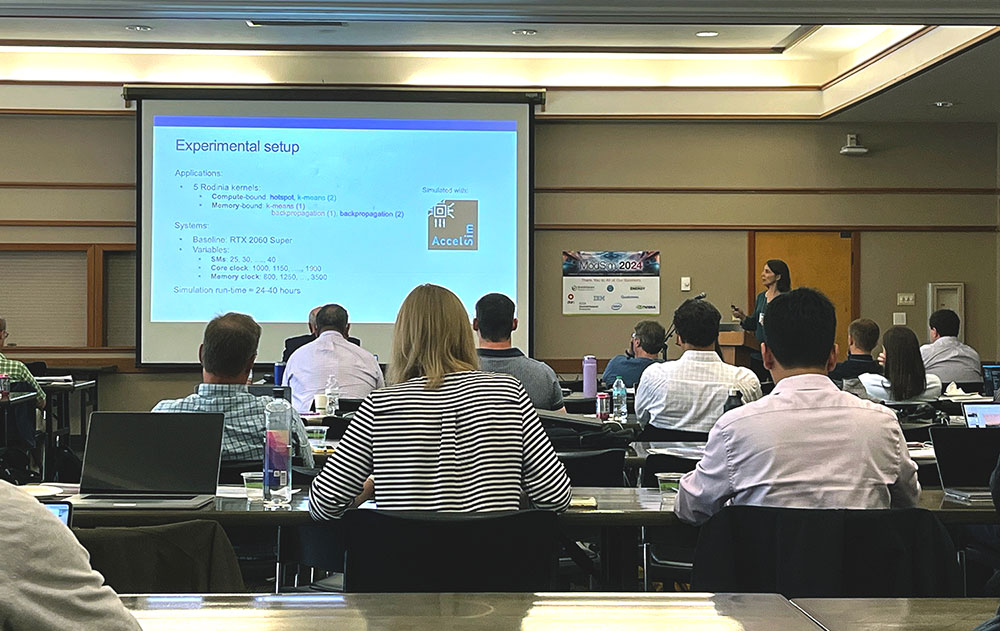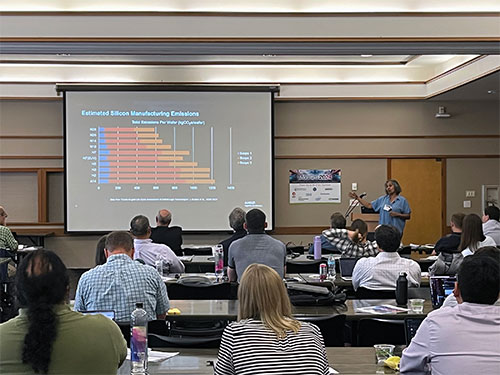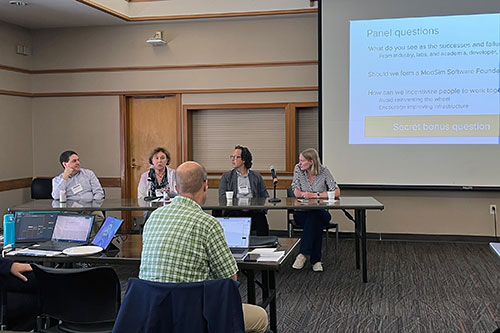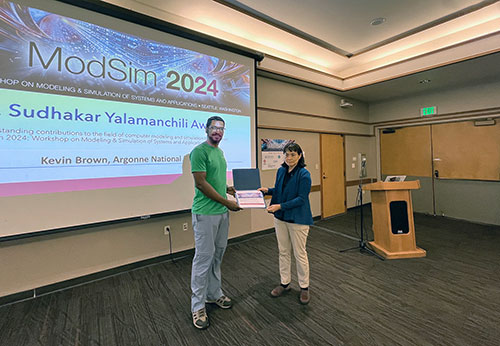Sustainable Computing Takes the Stage at ModSim 2024
ModSim 2024 is a long-running workshop hosted by Brookhaven Lab
September 27, 2024
 enlarge
enlarge
Ana Lucia Varbanescu, a professor from the University of Twente, was among the many first-time speakers at this year's Workshop on Modeling & Simulation of Systems and Applications. Brookhaven Lab has been the primary organizer of the workshop since 2018.
In 2024, the Workshop on Modeling & Simulation of Systems and Applications celebrated its 13th year as the nexus for engaging the modeling and simulation (ModSim) research community. ModSim 2024 took place over nearly three days at the University of Washington’s Center for Urban Horticulture in Seattle, where attendees pondered the state of this high-impact field in the computing ecosystem that focused on a relatively new theme for this community: ModSim for Sustainable Computing.
Given its centrality for economic development, national security, environment, energy consumption, and competitiveness, the study, modeling, and optimization of a sustainable computing ecosystem have profound societal importance. ModSim 2024 emphasized sustainability in a technological sense by asking if the exponential growth in demand for computing is sustainable and how the ModSim community can lead the charge in developing new, energy-efficient architectures, systems, and applications using novel simulation capabilities that encompass sustainability.
 enlarge
enlarge
In her first-ever talk at the ModSim workshop, Srilatha (Bobbie) Manne, a senior fellow with AMD, a company that develops high-performance computer processors, addressed "Sustainable Computing at Scale."
As in prior years, a special keynote speaker — this time, Google’s Chief Technologist for High Performance Computing, Bill Magro — kicked off the proceedings. Magro’s talk, “HPC at a Crossroads: Navigating the AI and Cloud Revolution,” harkened back to the disruption artificial intelligence has caused at Google and within the computing field while emphasizing the ways it is helping to sustain and advance all aspects across the hardware-software stack. Magro offered insightful analysis of the similarities and differences between HPC and hyperscalers along with informed predictions about the AI-driven increase in computing needs and its relation to sustainability.
“A hallmark of the ModSim workshop has been hosting leading computing experts from all disciplines and research areas,” said Adolfy Hoisie, chair of the Systems, Architectures, and Emerging Technologies department at the U.S. Department of Energy’s (DOE) Brookhaven National Laboratory. He also served as the ModSim 2024 Organizing Committee Chair. “Bill Magro proved to be an outstanding continuation of that practice, setting the tone for this year’s deep dive into sustainability.”
ModSim works for sustainability
ModSim 2024 featured a variety of esteemed international speakers, many new to the workshop, and they spanned sessions that examined the state of software sustainability to ModSim for sustainable computing. As part of that global view, Fredrik Robertsén, a technology strategist with the LUMI Leadership Computing Facility, treated attendees to a closer look at how the pre-exascale machine, hosted by CSC–IT Centre for Science in Kajaani, Finland, incorporated aspects of sustainability, concerning power availability, data center cooling, waste heat reuse, and overall cost controls, from the system’s initial siting to its present-day operations.
In her talk, Ana Lucia Varbanescu, a professor at the University of Twente in the Netherlands, addressed the weighty topic of reducing waste in computing, making the case for using model-based design-space exploration to codesign for sustainability. Meanwhile, Simon McIntosh-Smith, director of the Bristol Centre for Supercomputing that hosts the United Kingdom’s Isambard-AI supercomputer, explained why simulating energy-efficient architectures, an elemental part of the HPC system’s installation at the University of Bristol, is so impactful to the environment.
 enlarge
enlarge
Panel discussions remain a popular part of the ModSim workshop experience. This one considered "Software Ecosystem Sustainability" with (left to right) Jeffrey Young (Georgia Institute of Technology), Almadena Chtchelkanova (National Science Foundation), David Donofrio (Tactical Computing Laboratories), and Gwendolyn Voskuilen (DOE's Sandia National Laboratories) sharing their diverse perspectives as Bruce Childers, dean of the University of Pittsburgh's School of Computing and Information, looks on.
Luca Carloni, a professor at Columbia University, discussed the role of ModSim in turning the increased complexity and heterogeneity of computer architectures to an advantage in creating sustainable computing platforms. His talk emphasized how the toughest challenge involves the complexity of full system integration, from the System-on-a-Chip, known as SoCs, to the extreme scale. Architectural heterogeneity, compounded by the reality of proprietary architectures, has led to the emergence of a robust, fast-growing open-source hardware community that, per Carloni, may be “a game changer.”
While other talks and the always-popular panel discussions explored standard research areas concerning system design and optimization, quantitative co-design, and application optimization, one overriding theme unified many of the presentations — namely, how computing emissions, caused by demands from AI workloads or HPC data center operations, are contributing negatively to the global carbon footprint. In his talk, Udit Gupta, an assistant professor at Cornell Tech, focused on the ecological implications associated with the computing ecosystem and described the development of computer architectural models to estimate carbon emissions, as well as other efforts to codesign solutions across the hardware-software stack.
And the winner is…
One of the most appreciated events at the ModSim workshop began in 2021 with the first-ever Dr. Sudhakar Yalamanchili Award. The award honors the late Yalamanchili, a beloved computer engineering professor and mentor at the Georgia Institute of Technology and an elemental contributor to the ModSim research community. Poignantly, Yalamanchili’s widow attended this year’s Sudha Award presentation, which went to Kevin Brown for his work, “Efficiently Composing and Controlling Hybrid Simulations of PDES and ML Models.” Brown, an Argonne Scholar-Walter Massey Fellow at DOE’s Argonne National Laboratory, detailed a novel framework featuring “Director,” an approach to combine parallel discrete event simulation (PDES) with machine learning (ML) that manages interactions between PDES and ML models to employ their best attributes for overall simulation optimization.
 enlarge
enlarge
Kevin Brown (left), from Argonne National Laboratory, was presented the ModSim 2024 Dr. Sudhakar Yalamanchili Award for his work, "Efficiently Composing and Controlling Hybrid Simulations of PDES and ML Models." Notably, Yalamanchili's widow was on hand to share in this year's Sudha Award presentation.
“It’s truly an honor to receive an award associated with Dr. Yalamanchili, who has had such a significant impact in our research community,” Brown said. “And, to connect with his legacy in this way with his widow present was an even greater privilege. It is wonderful that early career researchers like me can continue to be supported and inspired by Dr. Yalamanchili through this award.”
As a repeat attendee, Brown has participated in the ModSim workshop a few times and found useful takeaways from every experience.
“The workshop is a great forum for showcasing my work and receiving invaluable feedback from key players in the field of ModSim and high-performance computing,” he added. “With this year’s theme on sustainability, I was able to learn about efforts in developing sustainable ecosystems for modeling and simulation tools, as well as opportunities for using such tools to build more sustainable systems in our communities. I have received insights that I will use to drive the next chapter of my career.”
With ModSim 2024 in the books, work already has started on next year’s workshop.
“We had another great year with a new, exciting theme that brought together some of the best minds in modeling and simulation and sustainable computing, but there is still so much this community can and will do to advance computing,” Hoisie concluded. “We are ready for the next adventure.”
To learn more about the 2024 Workshop on Modeling & Simulation of Systems and Applications, visit the workshop’s homepage.
Brookhaven National Laboratory is supported by the Office of Science of the U.S. Department of Energy. The Office of Science is the single largest supporter of basic research in the physical sciences in the United States and is working to address some of the most pressing challenges of our time. For more information, visit science.energy.gov.
Follow @BrookhavenLab on social media. Find us on Instagram, LinkedIn, X, and Facebook.
2024-22109 | INT/EXT | Newsroom









